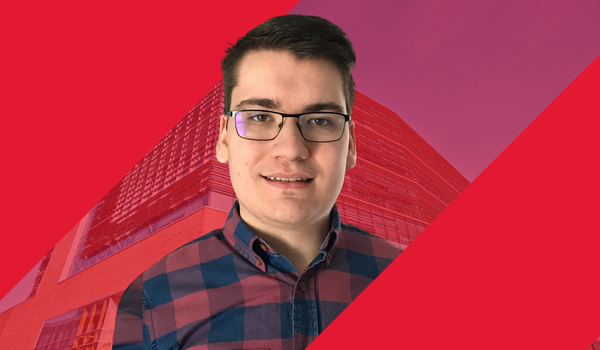When thinking of career opportunities for bioscience majors, tech giants like Google and Amazon may not be among the first destinations that come to mind. But, that’s exactly where two recent University of Maryland (UMD) alumni landed after earning dual degrees in bioengineering and computer science.
Having graduated from UMD before the launch of the B.S. in Biocomputational Engineering degree, Andres Gonzalez (B.S. ‘18) and Chris Look (B.S. ‘20) charted their own respective pathways that merged their love of biology, physics, and lab research with computer programming. Their hard work paid off. Today, both Andres and Chris are working as software engineers – Andres with Google, and Chris with Amazon.
The two offered their unique insights on what it’s like to work at the convergence of bioengineering, big data, and computer programming, and shared why UMD’s biocomputational engineering degree program could spell new opportunities for those who wish to follow a similar path.
Did you know… we’re accepting applications for Fall 2021 enrollment in the B.S. in Biocomputational Engineering degree program? Book a quick virtual meeting with our program coordinator Emily Bailey to learn how to navigate your Fall 2021 application!
Below are highlights from our interviews with Andres and Chris:
Q: As a bioengineering/computer science graduate, can you shed some light on the opportunities this new degree could afford its graduates?
 Andres: I think that the biotech industry is growing quickly and that this degree would let you become highly competitive in the industry, as a degree of this caliber is relatively rare. A Clark School degree is nothing to scoff at! Everyone is buzzing about big data and it's becoming more and more true that an engineer of any type will need to know how to work with data and [how to] program. Industry will love to know someone coming in with this degree doesn’t need to be trained to program and just needs to be trained on what is being worked on.
Andres: I think that the biotech industry is growing quickly and that this degree would let you become highly competitive in the industry, as a degree of this caliber is relatively rare. A Clark School degree is nothing to scoff at! Everyone is buzzing about big data and it's becoming more and more true that an engineer of any type will need to know how to work with data and [how to] program. Industry will love to know someone coming in with this degree doesn’t need to be trained to program and just needs to be trained on what is being worked on.
I also believe the same is becoming true in research labs. From my experiences, research labs lack skilled computational types but would greatly benefit from having them in their lab. Labs will put you in direct contact with the big data being produced and the applications are endless and super exciting. Having a strong foundation in computations, programming, biology, and physics will let you be able to work almost anywhere. Learning computational skills from an engineering perspective is a perfect way to gain this skill set and that's why this mixed discipline degree seems like a great choice!
 Chris: Learning quantitative problem solving skills and programming will be incredibly helpful in today's bioengineering field, because a lot of things are done computationally. If you want to examine a huge data set, it’s easiest to do it with R, Pandas, or Python. And to do that, you'd have to understand a decent amount of computer science and how to manipulate data correctly. Some of the best ways to do a lot of modern data analysis are through pretty deep computer programming. Speaking from my experience, you really need to know not only data analysis, but also software engineering. So when I say data analysis, I mean that you’re given a data set and it’s up to you to determine how to get significant or valuable insights out of it. But for software engineering, you may actually build a data pipeline. For example, in the past, I’ve developed a pipeline which could take in patient data, apply relevant filters, and produce a feature data set from the function I’d created.
Chris: Learning quantitative problem solving skills and programming will be incredibly helpful in today's bioengineering field, because a lot of things are done computationally. If you want to examine a huge data set, it’s easiest to do it with R, Pandas, or Python. And to do that, you'd have to understand a decent amount of computer science and how to manipulate data correctly. Some of the best ways to do a lot of modern data analysis are through pretty deep computer programming. Speaking from my experience, you really need to know not only data analysis, but also software engineering. So when I say data analysis, I mean that you’re given a data set and it’s up to you to determine how to get significant or valuable insights out of it. But for software engineering, you may actually build a data pipeline. For example, in the past, I’ve developed a pipeline which could take in patient data, apply relevant filters, and produce a feature data set from the function I’d created.
I think having those kinds of skills really lets you do whatever you want. It opens up a whole new world where if you think of an idea – if you want to apply a machine learning algorithm to a data set or investigate a new feature – you can actually do it yourself.
Q: What are some of the greatest ways biotechnology has impacted society? What do you think the future of biotechnology looks like?
 Andres: I think the greatest way biotechnology has impacted society is that it has given us an inflated view of being able to solve all biological problems, including aging. The fact that society feels this way suggests how amazing our technology is and is becoming.
Andres: I think the greatest way biotechnology has impacted society is that it has given us an inflated view of being able to solve all biological problems, including aging. The fact that society feels this way suggests how amazing our technology is and is becoming.
In the future, I believe we will eventually be able to understand the specificity of each person's bodies and genetic expression, allowing us to develop person-specific treatments for all types of issues.
 Chris: Biotechnology allows us to go beyond the limits of humanity. Computers can analyze data so fast and on such a large scale. This will also allow for people to focus on what really matters - the ability to develop new innovations to help other people. It opens the door for all sorts of things that humans couldn’t do before.
Chris: Biotechnology allows us to go beyond the limits of humanity. Computers can analyze data so fast and on such a large scale. This will also allow for people to focus on what really matters - the ability to develop new innovations to help other people. It opens the door for all sorts of things that humans couldn’t do before.
Talking about big data – it's definitely a buzz word now – there's so much more data than there was before. I think people are just now throwing it out into the universe, hoping that someone will get some type of value out of it. And there is a lot of value to be gotten out of it, if we develop the right skills.
Are you excited to develop bioengineering and computational skills to work at a company on the forefront of innovation?
Learn from others who are working at the nexus of bioscience and technology during our free, midday March 19th Leveraging Artificial Intelligence in Human Health virtual event!
In addition to the webinar, you’ll have an opportunity to take part in free add-on networking events, including a 20-minute meet and greet with our speakers. Please note, space is limited for this event!



